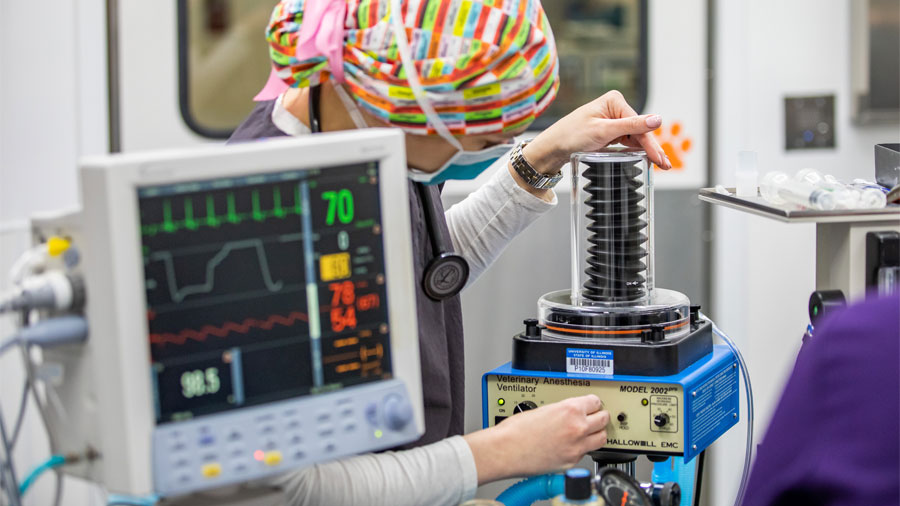Got a headache? An upset stomach? The sniffles? While you can pick up something from the local drug store to help you feel better, you should never assume that the medicine that works for you will be safe for your companion animal.

Dr. Lauren Forsythe, a pharmacist at the University of Illinois Veterinary Teaching Hospital in Urbana, shares her expertise about common medications that can be harmful to pets.
Pain Relievers: NSAIDs and Acetaminophen
Nonsteroidal anti-inflammatory drugs (NSAIDs) help to reduce pain, fever, and inflammation in humans. Common NSAIDs include aspirin, ibuprofen (e.g., Advil), and naproxen (e.g., Aleve).
“While veterinarians may sometimes recommend human over-the-counter medications for pets, many varieties of human medications are toxic to dogs and cats. Pain medications are among the most toxic,” says Dr. Forsythe.
Human pain medications are much more likely to cause toxicity in animals than they are in people, which is why there are veterinary-specific medications that are less toxic.
Acetaminophen (e.g., Tylenol) is not an NSAID. It relieves fever and pain but does not reduce inflammation.
“Acetaminophen should never be given to a cat,” says Dr. Forsythe. “Even an infant dose can cause severe adverse effects or potentially lead to death.”
Medications for Allergies, Nausea
Antihistamines such as diphenhydramine (Benadryl) are sometimes recommended by veterinarians. But, Dr. Forsythe warns, many commercial medications contain a variety of active ingredients. For example, certain products address several symptoms that can occur together, such as allergic reactions and nasal congestion or pain.
“Pet owners should consult with their veterinarian before giving any human over-the-counter medication to their pet. The veterinarian will know how to assess the pet’s potential underlying health issues, possible interactions with medications the pet already takes, and what the proper dose is for that particular pet,” says Dr. Forsythe.
Additionally, pet owners often want to treat their vomiting dog with a commercial medication. The main brands, including Pepto Bismol, contain bismuth subsalicylate, which is similar to aspirin. Products containing bismuth subsalicylate can have adverse effects in dogs and are not recommended.
Topical Antibiotics and Antifungals
Topical antibiotics may provide local benefits and avoid the problems sometimes associated with oral or injectable antibiotics. However, animals are likely to lick and groom themselves, which can turn a topical medication into an oral medication. Ingesting some topical medications could be very dangerous for pets.
In general, any wounds on your pet that might lead to infection should be seen by a veterinarian. A veterinarian will know which medications are safe and will stitch the wound, if necessary.
Similarly, a medical professional should be consulted regarding treatment for a fungal infection. The treatment will depend on the site and severity of the infection. Often, prescription oral antifungals are necessary when topical antifungals aren’t appropriate.
Why OTC Medications Aren’t for Pets
“Most over-the-counter medications are designed to treat symptoms, not the underlying cause,” says Dr. Forsythe. While humans and animals may experience similar symptoms, the underlying causes can be completely different. For that reason, what works for the symptoms in a person may not work in an animal.
There are also important differences between animals and people in how the body absorbs and metabolizes drugs. These differences can affect the efficacy of a medication as well as its toxicity.
Not only should you not give human medications to pets, but it is very important to prevent pets from accidentally ingesting medications.
“Keep all medications, especially flavored ones, out of reach of pets,” Dr. Forsythe recommends. “If you have a counter-surfing pet, you may need to keep medications inside a closed cabinet.” Even when the bottle is closed, an animal can chew its way in if something smells appealing enough.
Dr. Forsythe advises storing all medications in their original packaging in an upper cabinet located in a cool place without excessive moisture. Make sure your pet is not allowed to lick a topical medication that you have applied to yourself.
If you think your pet has ingested a medication unintentionally, contact your veterinarian or the ASPCA’s Animal Poison Control Center 24-hour hotline at (888) 426-4435.
By Crystal Munguia




